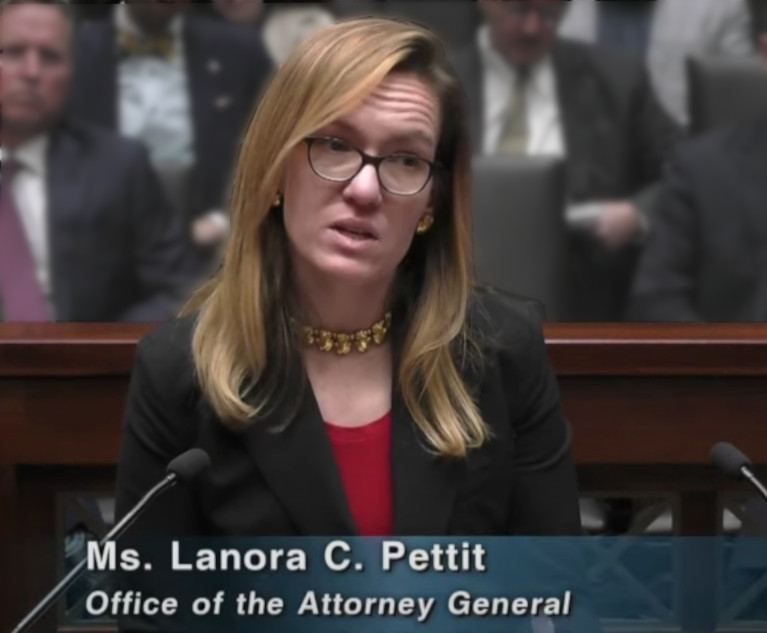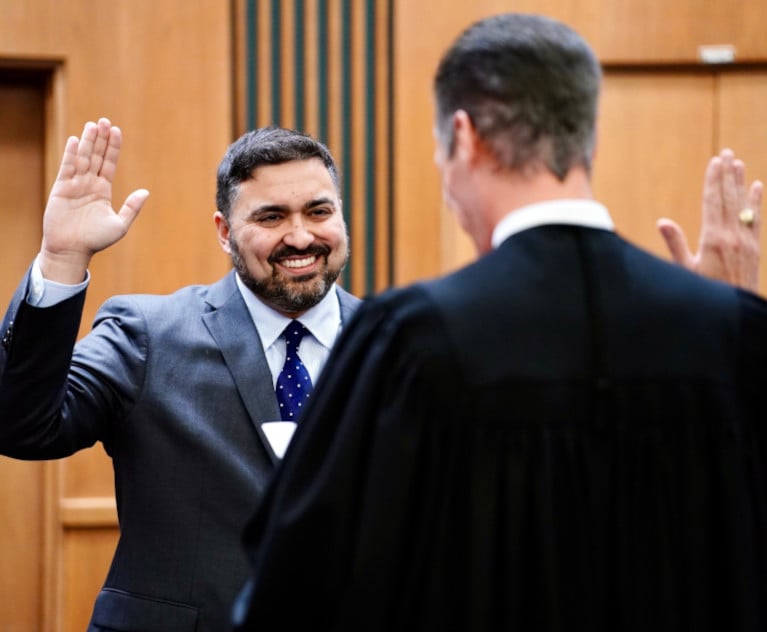Layoffs and Unemployment Basics During the Coronavirus Pandemic
During this time of grave uncertainty, it is critical for lawyers to play their "counselor" role. We must help our clients navigate these complex employment issues, while keeping the client's long-term business in mind.
April 13, 2020 at 11:41 PM
6 minute read
 Alana K. Ackels is a partner with Dallas-based Bell Nunnally (courtesy photo)
Alana K. Ackels is a partner with Dallas-based Bell Nunnally (courtesy photo)
In the wake of the coronavirus pandemic, employers are facing serious decisions about how to keep their businesses afloat. With payroll topping the list of costs for most employers, many companies are having to consider some type of furlough or layoff of their employees. This is especially true for businesses impacted by government shelter-in-place orders. The recent $2 trillion stimulus package will provide some relief in the form of federal loans and grants, but it is still uncertain how quickly companies can get these funds.
During this time of grave uncertainty, it is critical for lawyers to play their "counselor" role. We must help our clients navigate these complex (and sometimes heartbreaking) employment issues, while keeping the client's long-term business in mind. Here are some general considerations for employers thinking about a coronavirus-related layoff or furlough.
What is the difference between a furlough and a layoff?
The Texas Workforce Commission (TWC) considers a furlough a type of temporary layoff. A furlough typically requires employees to work fewer hours or take a short-term mandatory leave. For example, a furlough could mean reduced hours by all or certain groups of employees. It could also mean staggered workweeks. Employers must be careful when furloughing exempt employees so that they continue to pay them on a salary basis and do not jeopardize their exempt status under the Fair Labor Standards Act (FLSA). A furlough that requires a full workweek of leave can accomplish this because exempt employees do not have to be paid for any week in which they perform absolutely no work.
A layoff occurs when employees are separated from employment because the employer has no more work available, eliminated the employee's position, or closed the business. A layoff can be permanent or temporary. A temporary layoff occurs when an employer believes conditions will change and intends to recall the person when work becomes available.
Are there alternatives to a layoff?
Yes. The TWC is encouraging employers to consider shared work plans (SWP) as an alternative to mass layoffs. Under a SWP, the employer reduces hours or furloughs workers, but the employees still qualify for partial unemployment benefits to supplement their income. Employers interested in participating in an SWP can submit an application on the TWC website.
Will employees qualify for unemployment benefits if they are furloughed or laid off because of the pandemic?
Probably yes. To be eligible for unemployment benefits, the person must be either unemployed or working substantially reduced hours through no fault of his or her own. This would include a furlough (if the reduction is substantial) or a layoff.
What is the process to apply for unemployment?
Employees can submit applications for unemployment on the TWC website.
The TWC allows employers to submit a mass claim request on behalf of their employees to streamline the unemployment benefit claims process. For employers conducting large layoffs that do not intend to dispute the claims, this can be a useful tool to get employees their benefits faster and reduce the company's administrative burden of handling each claim separately. Employers can submit a mass claim request on the TWC website.
When will employees start receiving unemployment benefits?
In response to the coronavirus pandemic, Texas suspended the one-week waiting period for benefits. This means that workers who qualify will start receiving benefits immediately after their claim is processed and approved.
Will company unemployment tax accounts be charged back and will rates go up?
Maybe. The TWC has stated that companies subject to a mandatory shutdown by government authorities may seek protection from chargebacks under Section 204.022 of the Texas Labor Code. In Texas, this means most "non-essential businesses" as defined by local and state shelter-in-place orders may qualify for chargeback protection. There may be further protection from chargebacks based on the disaster declaration made by Gov. Greg Abbott in March, but the TWC has not yet taken a position on whether businesses would qualify for protection under this section due to the pandemic.
Employers should carefully document that any COVID-19-related layoffs are, in fact, based on the pandemic or a government shutdown order, as applicable, if they wish to seek protection from a chargeback in the future.
Can a company conduct a layoff of employees on leave under the Families First Coronavirus Response Act?
Yes. Under the new law, the general rule is that an employee has to be restored to the same or equivalent position when the leave expires. However, there is an exception to this rule when the position held by the employee at the time the leave started no longer exists because of economic conditions or changed operating conditions impacting employment that are caused by the pandemic.
If a business conducts a layoff of employees on coronavirus-related leave because their positions (or equivalent positions) no longer exist, the business must make reasonable efforts for a year to restore those employees to the same or equivalent position.
Will a layoff impact eligibility for a payroll protection loan under the new stimulus package?
No. A layoff does not impact a company's ability to qualify for a payroll protection loan under the Coronavirus Aid, Relief, and Economic Security Act (CARES). The amount of the loan is determined using prepandemic payroll numbers. However, the amount of the loan that qualifies for loan forgiveness is reduced based on layoffs or wage reductions made by an employer. If an employer restores its employee count and wages to prepandemic levels by June 30, 2020, then the loan forgiveness amount is not impacted.
We have little guidance on how these new laws will be interpreted and enforced, and the situation with COVID-19 is changing every day. If a company is considering a COVID-19-related layoff or furlough, please encourage it to consult with an employment attorney to talk through the risks and the most up-to-date information available.
Alana K. Ackels is a partner with Dallas-based Bell Nunnally. She can be reached at [email protected], or via the firm's website, www.bellnunnally.com.
This content has been archived. It is available through our partners, LexisNexis® and Bloomberg Law.
To view this content, please continue to their sites.
Not a Lexis Subscriber?
Subscribe Now
Not a Bloomberg Law Subscriber?
Subscribe Now
NOT FOR REPRINT
© 2025 ALM Global, LLC, All Rights Reserved. Request academic re-use from www.copyright.com. All other uses, submit a request to [email protected]. For more information visit Asset & Logo Licensing.
You Might Like
View All


Law Firms Mentioned
Trending Stories
- 1Uber Files RICO Suit Against Plaintiff-Side Firms Alleging Fraudulent Injury Claims
- 2The Law Firm Disrupted: Scrutinizing the Elephant More Than the Mouse
- 3Inherent Diminished Value Damages Unavailable to 3rd-Party Claimants, Court Says
- 4Pa. Defense Firm Sued by Client Over Ex-Eagles Player's $43.5M Med Mal Win
- 5Losses Mount at Morris Manning, but Departing Ex-Chair Stays Bullish About His Old Firm's Future
Who Got The Work
J. Brugh Lower of Gibbons has entered an appearance for industrial equipment supplier Devco Corporation in a pending trademark infringement lawsuit. The suit, accusing the defendant of selling knock-off Graco products, was filed Dec. 18 in New Jersey District Court by Rivkin Radler on behalf of Graco Inc. and Graco Minnesota. The case, assigned to U.S. District Judge Zahid N. Quraishi, is 3:24-cv-11294, Graco Inc. et al v. Devco Corporation.
Who Got The Work
Rebecca Maller-Stein and Kent A. Yalowitz of Arnold & Porter Kaye Scholer have entered their appearances for Hanaco Venture Capital and its executives, Lior Prosor and David Frankel, in a pending securities lawsuit. The action, filed on Dec. 24 in New York Southern District Court by Zell, Aron & Co. on behalf of Goldeneye Advisors, accuses the defendants of negligently and fraudulently managing the plaintiff's $1 million investment. The case, assigned to U.S. District Judge Vernon S. Broderick, is 1:24-cv-09918, Goldeneye Advisors, LLC v. Hanaco Venture Capital, Ltd. et al.
Who Got The Work
Attorneys from A&O Shearman has stepped in as defense counsel for Toronto-Dominion Bank and other defendants in a pending securities class action. The suit, filed Dec. 11 in New York Southern District Court by Bleichmar Fonti & Auld, accuses the defendants of concealing the bank's 'pervasive' deficiencies in regards to its compliance with the Bank Secrecy Act and the quality of its anti-money laundering controls. The case, assigned to U.S. District Judge Arun Subramanian, is 1:24-cv-09445, Gonzalez v. The Toronto-Dominion Bank et al.
Who Got The Work
Crown Castle International, a Pennsylvania company providing shared communications infrastructure, has turned to Luke D. Wolf of Gordon Rees Scully Mansukhani to fend off a pending breach-of-contract lawsuit. The court action, filed Nov. 25 in Michigan Eastern District Court by Hooper Hathaway PC on behalf of The Town Residences LLC, accuses Crown Castle of failing to transfer approximately $30,000 in utility payments from T-Mobile in breach of a roof-top lease and assignment agreement. The case, assigned to U.S. District Judge Susan K. Declercq, is 2:24-cv-13131, The Town Residences LLC v. T-Mobile US, Inc. et al.
Who Got The Work
Wilfred P. Coronato and Daniel M. Schwartz of McCarter & English have stepped in as defense counsel to Electrolux Home Products Inc. in a pending product liability lawsuit. The court action, filed Nov. 26 in New York Eastern District Court by Poulos Lopiccolo PC and Nagel Rice LLP on behalf of David Stern, alleges that the defendant's refrigerators’ drawers and shelving repeatedly break and fall apart within months after purchase. The case, assigned to U.S. District Judge Joan M. Azrack, is 2:24-cv-08204, Stern v. Electrolux Home Products, Inc.
Featured Firms
Law Offices of Gary Martin Hays & Associates, P.C.
(470) 294-1674
Law Offices of Mark E. Salomone
(857) 444-6468
Smith & Hassler
(713) 739-1250







